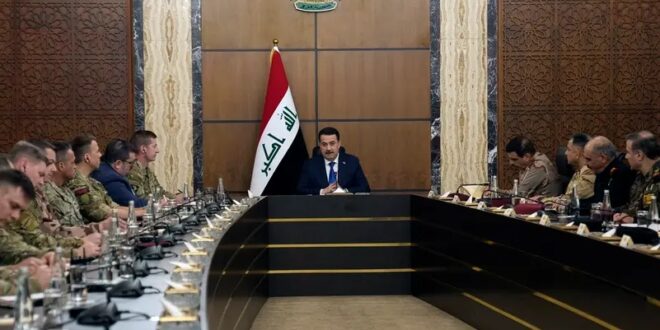Baghdad weaning off depending on Iranian electricity, senior State Department official tells Al Arabiya English
A senior US State Department official said Thursday that “just about everybody” in Iraq realizes the importance of having strong ties with Washington ahead of a scheduled visit by Iraqi Prime Minister Mohammed Shia al-Sudani.
“Some obviously have strong views on what it should look like,” the official told reporters ahead of Sudani’s visit to the US next week.
For the latest updates on the Israel-Palestine conflict, visit our dedicated page.
Speaking on condition of anonymity, the official said that some Iraqi officials have expressed the need for more private US investment while others have raised the possibility of “adjustments on US presence” inside the country.
Senior American and Iraqi military officials met on Monday in Baghdad to discuss the next phase of what the US troop presence in Iraq will look like going forward. After the meeting, a Pentagon official told Al Arabiya English that the next significant milestone would be during the second Joint Security Cooperation Dialogue this summer.
Decisions are expected to be made then, but the Iraqis have not expressed any desire for US forces to leave during the recent meetings.
Nevertheless, according to the State Department official, next week’s talks between Sudani and senior American officials will be on the entire US-Iraq relationship, with the main focus being economic ties.
Randa Slim, a senior fellow at the Washington-based Middle East Institute, said the visiting delegation would not include Iraqi military officials. “The main purpose of Sudani’s visit is for the US and Iraqi leaders to exchange their perspectives on the future of a multi-track, long-term bilateral relationship between the two countries,” Slim told Al Arabiya English.
Iraq making progress on energy independence
The State Department official said increasing Iraq’s energy independence would also be a key topic of discussion next week. The US has been urging Iraq to wean off using Iranian energy; however, the Treasury Department has routinely provided sanctions waivers to Baghdad to continue spending on Iranian imports of electricity.
“There’s an interesting statistic that as they [Iraq] have found ways to improve their energy sufficiency, they have cut their imports of Iranian electricity by more than half. They still rely on electricity from Iran, but it has significantly decreased,” the official said in response to a question from Al Arabiya English. “So yes, I think there is a lot of progress that they’ve made.”
While acknowledging that some of the ambitious megaprojects take time, the US is optimistic about Iraq’s energy future. It anticipates that by 2030, Iraq will have significantly improved its energy position, placing it in a “much, much better position.”
The official pointed to an electricity project that has come online between Iraq and Jordan and an internet line with Gulf countries in the final stages of discussions. In addition, the State Department said talks are ongoing for more electricity lines between Iraq and Saudi Arabia.
Slim said Sudani is also slated to visit Houston to meet with American business executives and advocate for more US economic engagement in Iraq.
“By focusing on the many different aspects of a cooperative bilateral relationship, Sudani hopes to de-emphasize the security lens through which the bilateral relationship has been defined since 2003 and which is a matter of domestic contestation, including within his governing alliance,” Slim added.
ISIS threat
US and Iraqi officials agreed last year to begin talks about the future shape and role of an international coalition to defeat ISIS, which is present at the invitation of the Iraqi government.
The first round of discussions was held in January but was quickly halted due to the deadly attack on US troops in Jordan, which US officials said had the fingerprints of Kata’ib Hezbollah.
Less than 24 hours after the US killed a senior Kata’ib Hezbollah commander, Iraq unilaterally announced a second round of talks with the US would be held on Feb. 11. The US quickly put out a statement confirming the talks.
US responses came after the Iran-backed attacks and the Jordan attack. The militias – armed, funded and trained by Tehran over the years – said the attacks would continue until a ceasefire was reached in Gaza. No attacks have been recorded on US troops since Feb. 4, making it the longest period with no attacks since Oct. 17. There were two, four-day lulls in November and December. A drone that was shot down last month over a US base in Syria was not assessed to be targeting American forces, officials said. And another two foiled drone attacks in Iraq were also not evaluated to be targeting US troops last week.
But Iraqi security forces have made remarkable accomplishments against the terror group. “We are very satisfied with the partnership, cooperation and synergy we have made with the Iraqi Security Forces to continue the continued defeat of Daesh,” the senior State Department official told Al Arabiya’s Nadia Bilbassy-Charters.
 Eurasia Press & News
Eurasia Press & News




